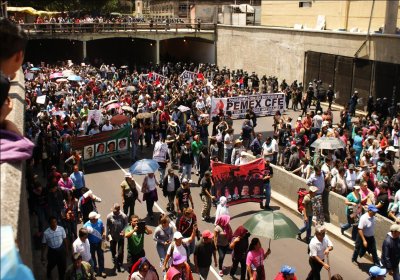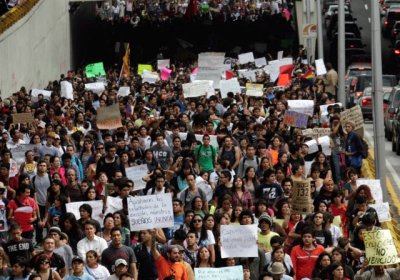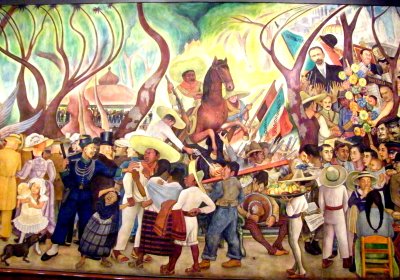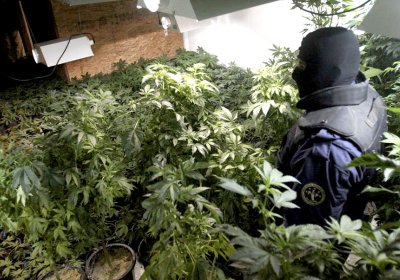Striking Mexican teachers from a dissident union leading popular resistance to the government’s neoliberal reform agenda in recent weeks.
Despite enduring relentless media hostility, the teachers' strike is now starting to broadened out to merge with protests against plans to hand over key national assets, such as Mexico’s state-owned oil industry, to the profit-hungry multinationals.
Mexico
Thousands of striking teachers seized two of Mexico City's central thoroughfares on a march to the president's residence on September 11 after losing their battle to block new educational reforms less than 24 hours earlier.
The teachers disrupted the centre of the city for at least the 14th time in two months, decrying a plan designed to break union control of Mexico's education system and, they say, damage education in Mexico's poor south in the process.
One has to hark back to 1968 in Mexico City, when thousands of students and workers marched against the Olympics, to find a sports-related demonstration that compares to the size and militancy of the mass anti-World Cup/Olympic protests taking place in Brazil.
As in Mexico City, thousands of people in Brazil took to the streets — and outside of stadiums hosting Confederations Cup matches — raising slogans that connect the spending and austerity that surround these mega-events to a much deeper rot in the nation’s democratic institutions.
Everywhere you look these days, things are turning green. In Chiapas, Mexico, indigenous farmers are being paid to protect the last vast stretch of rainforest in Mesoamerica. In the Brazilian Amazon, peasant families are given a monthly “green basket” of basic food staples to allow them to get by without cutting down trees. In Kenya, small farmers who plant climate-hardy trees and protect green zones are promised payment for their part in the fight to reduce global warming.
The final official results in Mexico's July 1 presidential election were published in the early hours of July 4, claiming Enrique Pena Nieto had won. However, his victory had been proclaimed within just a few hours of the voting centres being closed and 1% of the ballots counted.
Pena Nieto, the candidate from the Institutional Revolutionary Party (PRI), was declared the winner with a 6.5% margin over progressive candidate Andres Manuel Lopez Obrador.
Alameda Park is Mexico City's languid space for lovers and open-air ballroom dancers: the gents in two-tone shoes, the ladies in finery and heels.
The cobbled paths undulate from the great earthquake of 1985. You imagine the fairground sinking into the cobwebs of cracks, its Edwardian organ playing forlornly. Two small churches nearby totter precariously: the surreal is Mexico's facade.
The United Nations global climate summit in Cancun, Mexico, looks set to repeat the failures of Copenhagen. The chances of Cancun producing a binding agreement that would avert climate disaster are next to zero.
Many world leaders have not even bothered to attend the summit, which runs from November 29 to December 10.
Leaders of rich nations and the media talked much about the “low expectations” of an agreement in the lead-up to the conference.
If at first you don’t succeed, redefine success. This phrase has become the unofficial motto of this year’s United Nations climate conference in Cancun, Mexico.
A week out from Cancun, which runs over November 29 to December 10, there is little hope of meaningful progress. Yet key players have sought to throw a shroud of official optimism over the looming failure.
Few Western politicians want a repeat of last year’s Copenhagen climate conference. They consider it a public relations disaster.
In Mexico, a war involving rival drug gangs, law enforcement agencies and the national army has officially claimed 23,000 lives since 2006.
This figure does not include the many thousands of innocent people who have been “disappeared” by police and army units.
The violence can be directly attributed to the corrosive impact of the North American Free Trade Agreement (NAFTA).
NAFTA was signed on January 1, 1994 between the United States, Canada and Mexico with the aim of removing trade and investment barriers between these nations.
In late August, Mexican authorities found the bodies of 72 migrants from Central and South America. They had been kidnapped on their way to the United States, brutally shot and left to die in a remote, abandoned ranch near a small town in northeastern Mexico.
Eighteen-year-old Luis Freddy Lala Pomavilla was one of two survivors of the massacre who managed to escape and lead authorities to the crime scene. He claimed he and his fellow US-bound migrants were kidnapped by the Zetas drug cartel and told they would either have to pay a ransom or work as drug couriers and hit men.
Six US banks control 60% of GDP
“They are Goldman Sachs, Morgan Stanley, JPMorgan Chase, Citigroup, Bank of America, and Wells Fargo. They have assets equivalent to 60 percent of our gross national product.
“And to put this in perspective, in the mid-1990s, these six banks or their predecessors, since there have been a lot of mergers, had less than 20 percent. Their assets were less than 20 percent of the gross national product.”
“The Adelitas have arrived/To defend our oil/Whoever wants to give it to the foreigners/ Will get the shit kicked out of him!” yodelled the brigades of women pouring onto the esplanade of the Mexican senate. The demonstration was to protest a petroleum privatisation measure President Felipe Calderon insists is not a petroleum privatisation measure — and which he sent onto the Senate for fast-track ratification at the tag end of the session this April.
- Previous page
- Page 9
- Next page








